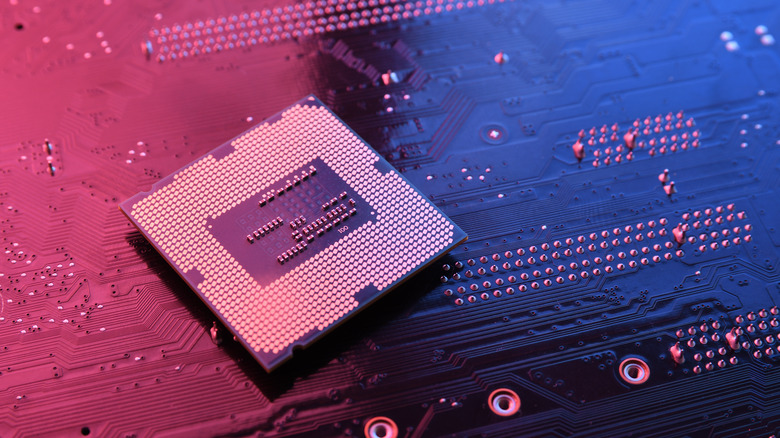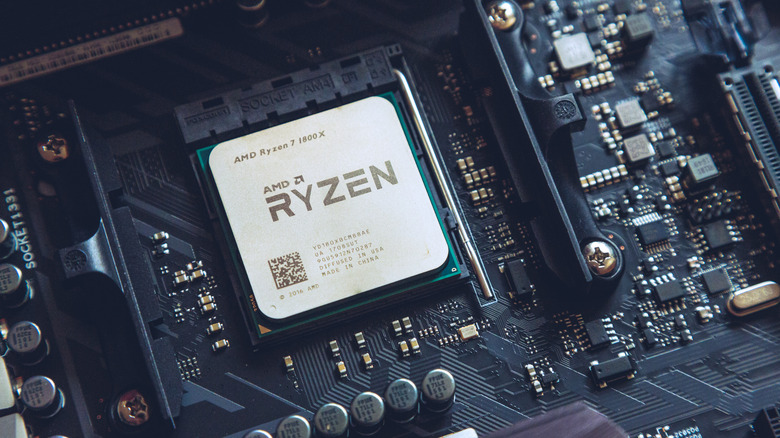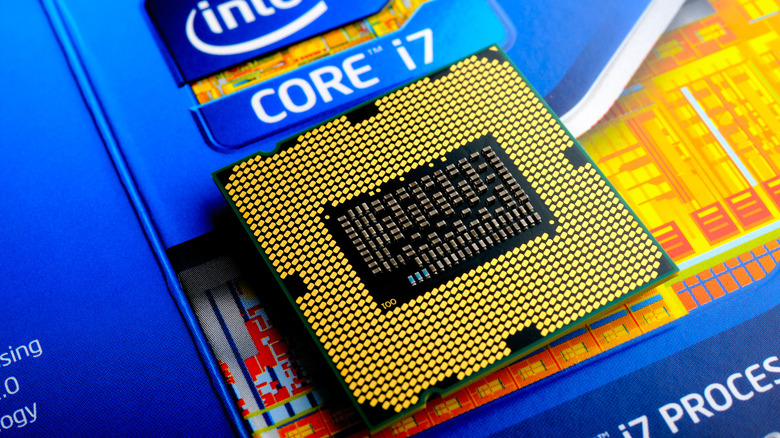
Zoomik/Shutterstock
By Eli Becht/
One of the biggest choices PC gamers have to make is determining whether they are going to go with an Intel or AMD central processing unit (CPU). For a long time, Intel was the clear winner among the community due to the weaker offerings from AMD with the Bulldozer line of CPUs, but the playing field is a lot more even now with the release of Ryzen on the AM4 platform and the gap has closed even more with the jump to AM5 socket.
Nowadays, it’s tough to go wrong with either choice, and it’ll come down to what you expect out of your PC. If you’re going for pure gaming, for example, you’ll consider different things than you would if you’re looking for a blend of productivity and gaming. CPU price will be a big factor that comes into play, and depending on when you look, you might find a lower cost for either chip. If you’re willing to look back a few generations instead of going for the cutting-edge, it’ll open up many more options, too.
What are AMD CPUs?

Spooh/Getty Images
The introduction of AMD’s Ryzen line also brought us the AM4 platform. This includes the Ryzen 1000 series up to 5000. The newer platform, AM5, includes the 7000 series line, and when the company expands its CPUs, it will add to that line. That means the AM4 platform has reached its end, but that doesn’t mean the hardware is completely outdated.
AMD breaks down the Ryzen line into three different tiers — Ryzen 3, 5, 7, and 9 — and as the number goes up, the performance increases with it. If you have already bought into the platform, you can upgrade to the AMD Ryzen 7 5800X3D CPU for one of the best gaming CPUs on the market, even if it is a little older.
The AM5 platform gives you much more to work with as the increased performance of the 7000 series is also coupled with the newer and faster DDR5 RAM. With it being a new platform, you also have upgrade paths unlocked in the future that’ll allow you to jump to newer CPUs as they release. For a lot of people, having that possibility open is a big selling point.
What are Intel CPUs?

4kodiak/Getty Images
Intel has been a strong option for many generations now, and the latest line is no different. The Intel 14000 series goes with the LGA1700 platform or socket, and that’s what many people building or buying a new PC in 2024 are going to be looking at. Intel, like AMD, has many tiers to pick from within the processor family. The cheapest and most budget-friendly option is the i3, and it goes up through the ranks through Core i5, i7, and i9. The i9 will be the most power-hungry of them all, but it’s also the best performance-wise.
The i9 gets very expensive, and it can cost over $500 for the CPU alone, so a lot of people like to stick in the i7 or even the i5 range for gaming. Also, like AMD, Intel sticks with the same socket for at least a few generations of CPUs, so being an early adopter would typically leave you room to upgrade in the future. This is big since you can just drop in another CPU instead of having to upgrade the motherboard along with it. However, there’s also a possibility the 14000 series is the end of the line for Intel’s current socket, with rumors of a next-gen LGA1851 platform gaining steam.
Is AMD or Intel better for gaming?

Mikkelwilliam/Getty Images
As it stands, the Ryzen 7 7800X3D is the CPU most recommended for gaming, as the addition of the L3 cache makes a big difference in getting the most performance out of a game. It does lag behind the competition in multi-tasking productivity, so that’s something you’ll have to keep in mind when building your PC. Eurogamer‘s Digital Foundry testing shows the 3D chips take a huge lead over Intel’s Core i7 and i9 lines.
Keep in mind that performance jump is just for gaming, so the gap isn’t as wide for people looking to do more with their PCs. As noted by Digital Foundry, the X3D chips are outclassed by the Ryzen 7 7950X and Intel i9 13900K in content creation workloads.
Bundles make a big difference for a lot of people, and they are a big deciding point in what platform people go for. For example, a Ryzen 7 7800X3D bundle with a motherboard and RAM costs $499.99 at Microcenter, while an Intel i7 13700K bundle costs $549.99. It’s not a huge price difference, but $50 could lead somebody to save money and go with AMD, and that would also result in the best all-around gaming CPU in 2024.
What about budget options?

Parilov/Shutterstock
Not everybody needs the highest-end CPU for gaming, and that’s where Intel begins to shine a bit more. While the manufacturer loses at the top end, Intel becomes much more competitive in the budget and mid-range sectors. We used to see AMD reign here while Intel took the high-end crown, but things have changed in recent years.
In Tom Hardware‘s testing at 1080p (the resolution where CPU performance is the most important), the Core i7 line usually beats the Ryzen 7. The same can be said down the line between Intel’s i5 and Ryzen 5, along with the i3 and Ryzen 3 lines. The gap isn’t massive by any means, so you can still gravitate toward what the cheaper option is and be perfectly fine. Budget buyers will want to save enough money to buy a good GPU, something that’s arguably more important in gaming.
AMD and Intel have given years of support to their respective CPU sockets, so future upgrades are an option for both. AMD has committed to using the new AM5 socket until at least 2025, so you will have upgrade options available down the line if you go AMD. Intel’s LGA1700 socket debuted back in 2021, and early adopters of it have a few generations they can upgrade to if they don’t want to jump ship completely when a new platform is released.